 |
| Download pdf file | Newsletter archives | |||
| Dieser Newsletter auf Deutsch | Cette newsletter en français | |||
 |
1. Will Brexit ever happen? |
 |
|
New Halloween deadline set for withdrawal
The Parliament voted on three occasions (15 January, 12 and 29 March 2019) with a substantial majority each time against the withdrawal agreement that the government had negotiated with the EU. A withdrawal with no agreement ("No-Deal") has also been rejected by the majority of MPs. This political deadlock has led to delaying the Brexit initially by two weeks and subsequently until 31 October 2019. Further delays appear inevitable, if there is no change in the political situation.
Local elections in England and Northern Ireland will be held on 2 May 2019 and the whole country will take part in the European elections on 23 May 2019. Pro-European parties want to use these elections as a "soft referendum" and according to polls can count on a strong mobilization of voters. Strong gains are forecast in particular for the Labour Party. On the other hand, members of the conservative party feel betrayed due to Theresa May's Brexit extensions and do not wish to take part in the election campaign. The government would have "completely lost contact with the voters". How long the government can remain in office and the conservative party avoid a split-up will be decisive for the future of Brexit.
No changes for European works councils
As long as the United Kingdom remains a member of the EU, the British EWC legislation (TICER 2010) continues to apply. Although the government had announced modifications in August 2018, these would only apply in the case of a "No-Deal" (see report in EWC News 3/2018).
Analysis in the German press: The Brexit is never coming
London EWC conference in the shadow of Brexit
Further topics were the new British Corporate Governance Code which came into force on 1st January 2019 and the debate on employee board level participation (see report in EWC News 4/2017). The conference focused on the legal cases filed by European works councils before the Central Arbitration Committee (CAC), the first instance court for collective labour law. The number of EWC legal disputes across Europe still remains very small. There is however no other EU country that has experienced such an accumulation as the UK. The CAC, which is responsible for England, Scotland and Wales, currently has three proceedings pending. They concern Vesuvius, the fireproof materials manufacturer from London (see report in EWC News 1/2013), the Princes Group from Liverpool, a food producer and subsidiary of the Mitsubishi group (see report in EWC News 1/2018) as well as the US company Hewlett Packard Enterprise (HPE). The chairwoman of its Special Negotiating Body gave a report on the HPE case, and has been waiting for the decision of the CAC since the breakdown of negotiations in October 2018 (see report in EWC News 1/2017). |
 |
2. Strikes affecting just-in-time manufacturing |
 |
|
Strike in Hungary paralyses car manufacturing in Germany
Hungary like Slovakia, has become an important location for the automobile industry, which benefits from the low wages there. In Hungary it accounts for 30% of the total trade in manufactured products and is dominated by German car manufacturers or suppliers. In the meantime however, skilled labour has become scarce particularly in West Hungary (Győr lies only 50 kms away from the Austrian border). The national unemployment rate was as low as 3.6% in December 2018 and double-digit wage increases can be observed in many industries (see report in EWC News 1/2018). Since January 2019, employers can oblige their employees to work 400 hours overtime per year and payment must only be cleared three years later, which represents a stealthy implementation of a six-day working week. Trade unions are speaking of a "slave labour law", which only serves the interest of multinational companies, in particular German car manufacturers. They are attempting to compensate the shortage of skilled labour by increased working hours. There were protest demonstrations against the legislation lasting for weeks in many cities at the turn of the year 2018/19.
Statement from the IG Metall trade union in Bavaria on the strike in Hungary Background report on collective bargaining agreement Report on new working hour's legislation Report on the protest demonstrations against the new law
Port strike in Sweden threatened to paralyze Volvo car manufacturing
This was caused by a conflict between competing Dockers' unions on the right to participate in collective bargaining which has been brewing for years, particularly in the port of Gothenburg (see report in EWC News 3/2017). The strike was avoided through an agreement which is described as "historic" and for the first time, will give the independent Dockers' union an equal access to the "Swedish Model" of social partnership and place it on an equal footing with the competing Transport Workers Union, affiliate of the main LO Confederation. As a consequence, the Swedish government's attempt to resolve the conflict in the ports by regulating collective bargaining rights by law based on the German model has also failed (see report in EWC News 4/2014).
Report on the effects of the planned strike Report on the historic agreement |
 |
3. Video conference instead of EWC meeting? |
 |
|
Italian paper manufacturer: no EWC meetings to protect the climate
The request for establishing the EWC was made in February 2014. In July 2014, central management announced that the constitutional meeting of the Special Negotiating Body would be convened as a video conference. Representatives could then be assisted by interpreters in their own countries. The justification given for this was the Paris climate agreement. Sofidel had committed to combat climate change internationally and video conferences would be a great opportunity to reduce the company's global emissions. In their filing to the court, trade unions are claiming that central management should have convened the Special Negotiating Body within six months, otherwise the negotiations should be considered as failed. Consequently, since August 2014 Sofidel actually disposes of a default EWC but which has just not yet been able to constitute itself. Employee representatives from several countries prepared for the legal proceedings in a meeting held in May 2015, sponsored by trade unions (see report in EWC News 2/2015).
Are travel and hotel costs "required" under the provisions of the EU Directive?
This is the key question of the legal case which the court has now denied. In its conclusions the court states, "that the 21st Century is characterized by an unprecedented technological evolution, in which an increasing number of day-to-day activities are facilitated by major innovations ... that society shaped by globalization and mass consumption and the necessary and constantly growing tendency, for reducing the time required to complete tasks impose rapid and clear rules and decision making on market participants". Jurisdictions should not elude such developments and must adapt legislation accordingly. Provisions for an advanced interactive video conferencing system would therefore be suitable. The Italian CGIL and CISL unions must now bear the entire costs of the legal proceedings, including 6,000 € for the employer's lawyer. They will appeal against the court ruling.
On this subject, the EWC Directive makes only provisions for crew members of seagoing vessels. While they are not ashore, they may participate in meetings by video conference, providing there are such provisions in the EWC's rules of procedure and that confidentiality of the conference connection is guaranteed. These new provisions have been in force since October 2017 in all EU Member States (see report in EWC News 2/2017). In contrast, video conferencing has already been possible in France since 2015 for the whole EWC, and not only for sailors (see report in EWC News 3/2015). There are currently 52 EWCs based in Italy. Face-to-face meetings are considered as "required" for all 52 of them. Sofidel would be the first company, where this is not the case.
No clear line in case-law
Up to now, court disputes on the validity of video conferencing have been ruled very differently in EWC judgments. In February 2018, the Central Arbitration Committee in London ruled that a teleconference does not represent an extraordinary meeting in the sense of the EWC Directive and nor the beginning of an information and consultation procedure (see report in EWC News 1/2018). In another case a few weeks later in April 2018, the Vienna labour and social courts ruled in the exact opposite sense (see report in EWC News 2/2018). This issue concerns an increasing number of European works councils and could lead to high-profile proceedings before the European Court of Justice in Luxembourg. |
 |
4. French and German judges contradict one another |
 |
|
French railways violates EWC law
In particular, the court criticized that even though the minutes of the French central works council meetings were communicated to the EWC, these did not include any figures or details on other countries. Furthermore, they did not receive the purchase offers of other prospective buyers who were not selected. Since the management had already taken its decision to sell STVA in the last quarter of 2016, the EWC should have already been involved before this date. This ruling on EWC consultation has a practical repercussion on the sale of the pan-European long-distance bus operator, Ouibus, which is imminent and will result in the loss of 100 jobs.
German judges decide not to impose sanctions retroactively
Immediately following the rejection of the injunction order, on 8 August 2018, the EWC filed the main case before the Bonn labour court for a ruling on the infringement. The judges however refused it on the grounds that it concerned events lying in the past which had now been finalized. The court ruling states that "it is not the duty of the courts to certify to a party whether he was in his right or not ... nor to provide an expert opinion on any legal question". The question whether the German legislator has correctly transposed the sanctions in the EU Directive still remains open. In May 2018, the European Commission had explicitly drawn attention to irregularities and indicated "the weakness of dedicated means for the EWCs to enforce their rights and the lack of dissuasive and proportionate sanctions in a majority of Member States" (see report in EWC News 2/2018). |
 |
5. Major SE conversions secure participation rights |
 |
|
Employer takes chair in French SE works council
The European works council which has been in place since 2003, will be replaced by the SE works council ("Faurecia European Company Committee") in spring 2019 and is composed of up to ten management representatives and 25 employee representatives from 16 countries. As usual in France, the council is chaired by the CEO. The select committee is made up of eight elected members, one from each of the eight largest countries. They designate one member to serve as liaison with central management and hold three meetings per year. The SE works council meets once per year. There are provisions for extraordinary meetings if at least 2.8% of the European workforce is affected by a measure in two countries. Below this threshold, the select committee remains responsible and in exceptional circumstances may also be informed by teleconference.
Employee representatives may commission two experts, one chartered accountant and one trade union officer. The costs are limited to an annual budget of 60,000 € for consultancy and to 100,000 € for four days training per term of office. There are additional paid English language courses. On top of the time for meetings, the time-off work allowance ranges from 25 to 75 hours per year depending on function. The SE works council may report on its activities on the Intranet but must nevertheless submit all texts to central management beforehand. Representatives are not allowed to send union flyers or publications to the workforce using company email.
Board-level employee participation remains in place
Whereas SE conversions are again and again readily used to completely avoid any workers' directors in Germany, this is not generally the case in France. The previous composition of Faurecia's board remains unchanged with 13 shareholder and two employee representatives, one of whom is elected by the SE works council. These provisions are in accordance with French legislation in force since 2013 (see report in EWC News 3/2015).
Press release on SE conversion
German commercial vehicle manufacturer with full-parity codetermination
The future SE works council has 35 members from 27 countries, whereby two seats are dedicated to the German group works council of the parent company Volkswagen in addition to five German MAN representatives. Sweden is represented by three representatives. One chairman and a deputy are elected for each of the two subgroups MAN and Scania, and as a result the SE works council has two chairpersons. The select committee is composed of ten members, who hold four annual meetings, whereas the plenary meets only once per year.
Strict consultation deadlines have been defined for restructuring. The SE works council has only eight weeks to render its opinion. If central management declines any of its proposals, the SE works council may request a second consultation procedure with a view to reaching an agreement within a further four weeks. An ad-hoc company arbitration board is established to resolve any disputes. The SE works council has extensive rights to training and besides external experts may also be supported by two full-time assistants.
One of the largest SE supervisory boards in Europe
Large German groups use SE conversions in order to reduce the number of seats on the supervisory board from 20 to twelve (see report in EWC News 2/2018). In contrast, at Traton it continues with 20 members, including ten employee representatives. Three seats are allotted to MAN and are elected from its German group works council together with three seats for Scania appointed by the SE works council. The German parent company Volkswagen is represented by two works council members and two seats are allotted to the trade unions, IG Metall in Germany and IF Metall in Sweden. |
 |
6. Mixed picture for small SE conversions |
 |
|
So far there have been no employee representatives on the supervisory board, since Flaschenpost is composed of 19 independent subsidiaries and codetermination rights would only apply starting from 2,000 employees. Although this could be avoided just in time by its conversion to a SE, it triggered however another event: in September 2018 for the first time a local works council was established at the Münster headquarters and was able to carry out negotiations together with the NGG trade union. The future SE works council is based on the standard rules of SE legislation without restrictions and an external union officer may participate on a permanent basis in their meetings. One special feature are the employee assemblies, where management voluntarily presents an annual report on employment and business planning. In all sites with 300 employees or more where there is no local works council, these meetings are no longer voluntary, but compulsory.
Press report on business model Report from Spiegel on-line news
No codetermination for German-Italian copper producer
In the new SE works council each country is allotted one delegate seat for every 500 employees, small countries are not represented. The term of office is five years, and two meetings are held each year. The steering committee is composed of three employee representatives and the chairman should have a good working knowledge of the Italian or English language. An extraordinary consultation takes place only if at least three countries are involved. Video and teleconferences are possible, if the chairman so decides. The agreement is relatively restrictive and falls below the standard rules of the SE Directive. As such, there are neither provisions for a two-stage consultation procedure following disputes nor any access to the minutes of supervisory board meetings. The SE works council is subject to extensive confidentiality obligations and may inform local works councils about its consultation procedures only after agreement from central management. Since the SE conversion was merely aimed at avoiding codetermination in the Holding's supervisory board, the substantially larger European works council for the KME Germany subsidiary established in 1996, continues to exist.
Innovative agreement to prevent escaping codetermination
The outcome of the negotiations was only made possible, because the German central works council had initiated court status proceedings to investigate whether the company had already more than 2,000 employees in Germany and therefore subject to full-parity codetermination. This would have then also applied to the SE (see report in EWC News 4/2018). However due to a high number of temporary contract workers a precise evaluation is more difficult in the building industry than in other industries. In the end both parties agreed on the above-mentioned compromise and the status proceedings were abandoned. The Special Negotiating Body, which managed to obtain the legal standard rules for the SE works council without any restrictions, was advised by the EWC Academy in co-operation with the IG BAU trade union.
Further information on codetermination in the SE |
 |
7. Newly established European works councils |
 |
|
Transnational group works council for PVC cable manufacturer from Burgundy
This is not the first case in France where the national group works council has been merged with the European works council. Most recently, Rio Tinto, the mining and raw materials group opted for this approach in March 2017 (see report in EWC News 4/2017). The energy company Total already merged both bodies in 2012 (see report in EWC News 4/2012).
French group for digital security systems establishes EWC
The new Idema EWC has 23 members from 13 countries, including six from France, who meet every six months. Although there are only 300 employees in the UK, their two EWC seats are to remain after Brexit. There is, in addition, another guest mandate for a European union federation. The select committee is made up of six employee and two management representatives and meets three times a year. On top of the time for official meetings the annual time-off work allowance ranges from 30 to 90 hours, depending on function. Each EWC member has a right to ten days training per term of office.
A time schedule has been defined for consultation. The EWC must render its opinion three weeks following the meeting, in which information was communicated. This period may be extended to six weeks if experts are commissioned. The consultation procedures at the national level begin in parallel with that of the EWC, but can only be concluded once the EWC has finalized its opinion. |
 |
8. Outstanding EWC agreements |
 |
|
British EWC moves even further up the league
Up to 50 representatives represent 29,000 employees in 31 European countries. Both of the largest countries (UK and France) with each more than 10,000 employees are allotted eleven seats each and the third largest country Germany with over 3,000 employees, seven. A Brexit clause guarantees that the UK workforce will continue to be represented in the EWC. The steering committee is composed of nine representatives, from all business divisions as well as from all of the five geographical regions. They meet quarterly. The plenary session is held twice per year. The EWC functions on the basis of a budget which is negotiated annually.
Apart from an extended selection of topics for information and consultation, for the first time the agreement includes a health and safety committee and a five-member diversity committee. Ordinary EWC members have an annual allowance of 20 days' time-off work, and members of the steering committee or other committees 50 days (which includes the time for meetings and up to five days training, but excludes the time for any language courses). Another divisional committee "Corporate Functions" is added to the existing EWC committees below the Holding. The accounting, shared service center and IT business units therefore now have their own committee.
As a rule, the EWC is always informed before national works councils and the implementation of any measures can only take place once the EWC's opinion has been rendered. There is a new provision for the establishment of national information and consultation forums in countries where there is no central or group works council. The EWC agreement hereby fills a gap in the legislation of many countries. In July 2018, the EWC had concluded a pan-European health agreement with central management (see report in EWC News 3/2018).
EWC concludes framework agreement on the future of work
Unilever not only wishes to provide employees with further training, so that they keep up with the evolution in the workplace, but also to maintain or enhance their employability on the job market, in case they should lose their jobs. The agreement promotes innovative approaches regarding the future of work, digitalization and new forms of employment. Joint working groups are established in all countries with equal participation of works councils and management which elaborate training programs for every subsidiary and every employee. Special programs will be developed to improve employability at sites which are particularly affected by the digital transformation. Furthermore the agreement promotes local agreements on pilot experiments.
For years the EWC has been running a campaign under the slogan "People before Profit" and was able to demonstrate that increased profitability is indeed compatible with the rights of employees to improved skills and competencies. In 2013, it was awarded the German works council prize for its "Barcelona Agenda" (see report in EWC News 2/2013).
The above mentioned topic will be covered in greater detail by the Unilever EWC chair during the 12th Hamburg Conference of the EWC Academy on 27 January 2020. |
 |
9. The view beyond Europe |
 |
|
Mechanism for resolving disputes at Hennes & Mauritz
Full text of the 2015 framework agreement
Volkswagen's global framework agreement suspended
Letter to the group's management Full text of the framework agreement
First global framework agreement in the Italian finance industry
Report on the European works council meeting Report on the global framework agreement |
 |
10. Interesting websites |
 |
|
Digitalization Glossary
Further information on Fair Work 4.0 project
Trade unions in Mediterranean finance industry
Download of the last annual report
Critical background reports from Europe
European network of employee friendly labour lawyers
Documents from the last conference in February 2019 |
 |
11. New publications |
 |
|
Study on transnational company agreements
Download of other language versions
Digitalization and Industry 4.0 in four countries
Further information on the compilation
Foreign groups and their practice of German codetermination
Report from a Workshop on the topic |
 |
12. The EWC Academy: Examples of our work |
 |
|
Hamburg EWC and SE conference with 52 participants from nine countries
The eleventh edition of the annual EWC Academy conference took place on 28 and 29 January 2019 and covered current developments in the EWC and SE. This time there was a focus on the legal and practical evaluation of the EWC Directive, which the European Commission had presented in May 2018 (see report in EWC News 2/2018). Two EWC members presented their transnational agreements: one on the minimum standards for the relocation of jobs to Eastern Europe at Deutsche Bahn (see report in EWC News 4/2015) and the other on teleworking at the Italian insurance group, Generali (see report in EWC News 3/2017). A workshop on Industry 4.0 took place on the second day in parallel with another on past legal proceedings in EWC matters.
The twelfth Hamburg conference will take place on 27 and 28 January 2020, again in the Harbour Hotel Hamburg with a view over the river Elbe and the city skyline.
US automobile supplier plans Shared service center in Lithuania
Training for newly established SE works council
|
 |
13. Current seminar schedule |
 |
|
The EWC Academy and its forerunner organization have been holding conferences and seminars for the members of European works councils, SE works councils and Special Negotiating Bodies since January 2009. So far, 807 employee representatives from 279 companies have taken part including many of them for several times. This represents around 21% of all transnational works council bodies in Europe. In addition there are numerous in-house events and guest lectures given to other organizations.
Overview of the forthcoming seminar dates
EWC and SE seminar in Montabaur Castle
Program of modules for both seminars Report on previous introductory seminar in Montabaur
Seminar on new EU General Data Protection Regulation
In-house events
|
 |
14. Imprint |
 |
|
EWC News is published by: EWC Academy GmbH
|
 The largest demonstration in the history of the country with more than one million participants was held on 23 March 2019 in London (photo). They were demanding a people's vote to decide in a second referendum since there was no majority for any of the Brexit options in the British Parliament. This has however been rejected by Brexiteers, since it is very likely there would be a majority for remaining in the EU. More than six million people signed an on-line petition for cancelling the withdrawal request. It is the largest petition, ever addressed to the British parliament.
The largest demonstration in the history of the country with more than one million participants was held on 23 March 2019 in London (photo). They were demanding a people's vote to decide in a second referendum since there was no majority for any of the Brexit options in the British Parliament. This has however been rejected by Brexiteers, since it is very likely there would be a majority for remaining in the EU. More than six million people signed an on-line petition for cancelling the withdrawal request. It is the largest petition, ever addressed to the British parliament.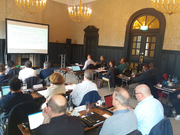 The EWC Academy held its sixth German-British conference on 21 and 22 March 2019 just a few days before the originally planned withdrawal from the EU. 25 participants from five countries turned up for the event in the Bloomsbury House in London city center. The date could have hardly been more appropriate: on the second conference day Catherine Barnard, a Professor for EU and employment law at Cambridge University was able to analyze the legal details of the Brexit extension agreement concluded the night before in Brussels.
The EWC Academy held its sixth German-British conference on 21 and 22 March 2019 just a few days before the originally planned withdrawal from the EU. 25 participants from five countries turned up for the event in the Bloomsbury House in London city center. The date could have hardly been more appropriate: on the second conference day Catherine Barnard, a Professor for EU and employment law at Cambridge University was able to analyze the legal details of the Brexit extension agreement concluded the night before in Brussels.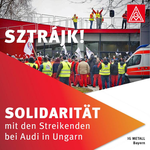 On 28 January 2019, production in the Audi Ingolstadt plant came to a halt for one week. The Nekarsulm plant as well as the Volkswagen plants in Leipzig and Bratislava (Slovakia) were also affected. This was caused by an interruption in the supply of engines from the Győr plant in Hungary which had been on strike since 24 January 2019. After only one week strike, the AHFSZ trade union managed to obtain an 18% wage increase (at least 235 € monthly). Prior to this, the average monthly earnings for assembly workers was 1,200 €. With its 13,000 employees, the Győr engine plant is the largest industrial site in Hungary and the trade union AHFSZ has about 9,000 members there.
On 28 January 2019, production in the Audi Ingolstadt plant came to a halt for one week. The Nekarsulm plant as well as the Volkswagen plants in Leipzig and Bratislava (Slovakia) were also affected. This was caused by an interruption in the supply of engines from the Győr plant in Hungary which had been on strike since 24 January 2019. After only one week strike, the AHFSZ trade union managed to obtain an 18% wage increase (at least 235 € monthly). Prior to this, the average monthly earnings for assembly workers was 1,200 €. With its 13,000 employees, the Győr engine plant is the largest industrial site in Hungary and the trade union AHFSZ has about 9,000 members there.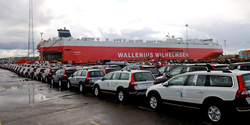 On 6 March 2019, a strike in several ports could be avoided at the very last moment. The largest Volvo plant in Torslanda (near Gothenburg) would have already had to stop their production on the following day. Volvo relies on regular supplies, and its stock in storage is only sufficient for a one day's production. The food imports to Sweden would also have been interrupted by the strike. There had already been a three-hour warning strike on 23 January 2019 in several Swedish ports.
On 6 March 2019, a strike in several ports could be avoided at the very last moment. The largest Volvo plant in Torslanda (near Gothenburg) would have already had to stop their production on the following day. Volvo relies on regular supplies, and its stock in storage is only sufficient for a one day's production. The food imports to Sweden would also have been interrupted by the strike. There had already been a three-hour warning strike on 23 January 2019 in several Swedish ports. On 7th February 2019, the district court (tribunale ordinario) in Lucca, Tuscany (photo) ruled on the modalities for organizing Special Negotiating Body and European works council meetings under Italian jurisdiction. The central management of Sofidel has categorically refused to finance any face-to-face meetings and is proposing video conferences instead. Sofidel is a family business manufacturing tissue paper products. It has 5,000 employees in Europe including 1,200 in Italy and the remainder throughout a further eleven countries.
On 7th February 2019, the district court (tribunale ordinario) in Lucca, Tuscany (photo) ruled on the modalities for organizing Special Negotiating Body and European works council meetings under Italian jurisdiction. The central management of Sofidel has categorically refused to finance any face-to-face meetings and is proposing video conferences instead. Sofidel is a family business manufacturing tissue paper products. It has 5,000 employees in Europe including 1,200 in Italy and the remainder throughout a further eleven countries.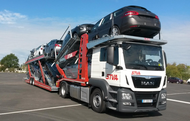 On 22 February 2019 the regional court in Bobigny (near Paris) ruled on a complaint filed by the SNCF's European works council against the central management. It started legal proceedings in December 2017, since only the French central works council had been informed and consulted on the sale of its STVA subsidiary to the Renault group. STVA has 2,150 employees in eight EU Member States and Morocco and does business in automobile logistics. In the judge's opinion, the EWC should also have been involved since this was a transnational matter. SNCF central management must pay a penalty of 15,000 € to the European works council for this infringement of law (French works councils have their own budget).
On 22 February 2019 the regional court in Bobigny (near Paris) ruled on a complaint filed by the SNCF's European works council against the central management. It started legal proceedings in December 2017, since only the French central works council had been informed and consulted on the sale of its STVA subsidiary to the Renault group. STVA has 2,150 employees in eight EU Member States and Morocco and does business in automobile logistics. In the judge's opinion, the EWC should also have been involved since this was a transnational matter. SNCF central management must pay a penalty of 15,000 € to the European works council for this infringement of law (French works councils have their own budget). On 15 March 2019, the Bonn labour court dismissed a complaint filed by the Deutsche Telekom's European works council. It had only been informed in February 2018, weeks after the German central works council, about plans for a substantial reduction in the workforce at T-systems and immediately requested an injunction order against central management. The Bonn labour court rejected this on 1st August 2018, although the EWC Directive specifies that an EWC is to be involved at the very latest at the same time, but not later than national works councils (see
On 15 March 2019, the Bonn labour court dismissed a complaint filed by the Deutsche Telekom's European works council. It had only been informed in February 2018, weeks after the German central works council, about plans for a substantial reduction in the workforce at T-systems and immediately requested an injunction order against central management. The Bonn labour court rejected this on 1st August 2018, although the EWC Directive specifies that an EWC is to be involved at the very latest at the same time, but not later than national works councils (see  The Faurecia group was registered as a European Company (SE) on 26 December 2018. This French company belongs to the world's ten largest automobile suppliers and manufactures inter-alia car seats. The majority of its shares belongs to PSA Peugeot Citroën. Half of its global turnover is generated by 45,000 workers in Europe, including 13,000 in France and 11,000 in Germany. The SE agreement was signed on 22 October 2018 at Faurecia headquarters in Nanterre near Paris, after only three rounds of negotiations.
The Faurecia group was registered as a European Company (SE) on 26 December 2018. This French company belongs to the world's ten largest automobile suppliers and manufactures inter-alia car seats. The majority of its shares belongs to PSA Peugeot Citroën. Half of its global turnover is generated by 45,000 workers in Europe, including 13,000 in France and 11,000 in Germany. The SE agreement was signed on 22 October 2018 at Faurecia headquarters in Nanterre near Paris, after only three rounds of negotiations. Volkswagen Truck & Bus has been operating as a European Company (SE) since 17 January 2019 under the new company name Traton. This subsidiary of the Volkswagen group with 81,000 employees is based in Munich and has a presence across Europe particularly through the German MAN group as well as through Scania from Sweden. The SE agreement was signed in Stockholm on 28 August 2018 after only one week of negotiations. MAN has already had practical experience with this legal form since 2009 when it established the hitherto largest parity-based SE supervisory board (see
Volkswagen Truck & Bus has been operating as a European Company (SE) since 17 January 2019 under the new company name Traton. This subsidiary of the Volkswagen group with 81,000 employees is based in Munich and has a presence across Europe particularly through the German MAN group as well as through Scania from Sweden. The SE agreement was signed in Stockholm on 28 August 2018 after only one week of negotiations. MAN has already had practical experience with this legal form since 2009 when it established the hitherto largest parity-based SE supervisory board (see  German beverage delivery service avoids codetermination
German beverage delivery service avoids codetermination The former Osnabrück Copper and Wire Company has been operating as KME SE since 22 February 2019. Only one week after its SE registration it acquired MKM (Mansfelder Kupfer und Messing), the fifth-largest company in Saxony-Anhalt. MKM has 1,200 employees in East Germany and a presence in the growth markets of electric mobility and renewable energies. KME has 1,700 employees in its head office in Osnabrück (Lower Saxony) and without the SE conversion would have run into parity-based codetermination. KME has about 4,000 employees worldwide and belongs to the Intek Group based in Milan. In Europe, besides Germany and Italy, there are further manufacturing plants in Spain and France. The SE agreement was signed on 14 November 2018 in Florence.
The former Osnabrück Copper and Wire Company has been operating as KME SE since 22 February 2019. Only one week after its SE registration it acquired MKM (Mansfelder Kupfer und Messing), the fifth-largest company in Saxony-Anhalt. MKM has 1,200 employees in East Germany and a presence in the growth markets of electric mobility and renewable energies. KME has 1,700 employees in its head office in Osnabrück (Lower Saxony) and without the SE conversion would have run into parity-based codetermination. KME has about 4,000 employees worldwide and belongs to the Intek Group based in Milan. In Europe, besides Germany and Italy, there are further manufacturing plants in Spain and France. The SE agreement was signed on 14 November 2018 in Florence. An SE agreement was signed on 5 March 2019 at the headquarters of the Köster construction group in Osnabrück, representing a completely new dimension for a family owned business. It is so far the only SE conversion in the whole of Europe with backstop for a return to German codetermination rules by any change in ownership. If the founding family's stake were to sink below 100%, employee representatives would be included into the SE supervisory board in the same proportion in accordance with the German codetermination legislation currently in force. The details would then be negotiated in a new SE agreement. There is currently no codetermination in the Köster Holding, but one-third participation in the largest subsidiary.
An SE agreement was signed on 5 March 2019 at the headquarters of the Köster construction group in Osnabrück, representing a completely new dimension for a family owned business. It is so far the only SE conversion in the whole of Europe with backstop for a return to German codetermination rules by any change in ownership. If the founding family's stake were to sink below 100%, employee representatives would be included into the SE supervisory board in the same proportion in accordance with the German codetermination legislation currently in force. The details would then be negotiated in a new SE agreement. There is currently no codetermination in the Köster Holding, but one-third participation in the largest subsidiary. An agreement for the establishment of a group works council which also incorporates Spain and Italy was concluded under French jurisdiction on 22 October 2018 at the headquarters of Benvic Europe in Chevigny-Saint-Sauveur (near Dijon). The company has only 225 employees in Europe and is therefore not subject to the EWC Directive. The group works council is composed of the managing director and three employee representatives (one per country) as well as three French trade union delegates with no voting rights. The employee side elects a general secretary. There are two meetings held per year and the works council can be advised by a chartered accountant.
An agreement for the establishment of a group works council which also incorporates Spain and Italy was concluded under French jurisdiction on 22 October 2018 at the headquarters of Benvic Europe in Chevigny-Saint-Sauveur (near Dijon). The company has only 225 employees in Europe and is therefore not subject to the EWC Directive. The group works council is composed of the managing director and three employee representatives (one per country) as well as three French trade union delegates with no voting rights. The employee side elects a general secretary. There are two meetings held per year and the works council can be advised by a chartered accountant. A EWC agreement for Idema was concluded on 18 November 2018. The company was founded in May 2017, as a result of the merger between the Identity & Security Division of the electronics group Safran and the Oberthur Technologies group. Both have their head offices in France and with 14,000 employees worldwide (including 4,700 in Europe) they manufacture identity documents, smart cards, biometric recognition systems as well as counterfeit-proof documents. While Oberthur Technologies has not yet had a European works council up to now, Safran has disposed of such a body since 2008, but only at the highest Holding level (see
A EWC agreement for Idema was concluded on 18 November 2018. The company was founded in May 2017, as a result of the merger between the Identity & Security Division of the electronics group Safran and the Oberthur Technologies group. Both have their head offices in France and with 14,000 employees worldwide (including 4,700 in Europe) they manufacture identity documents, smart cards, biometric recognition systems as well as counterfeit-proof documents. While Oberthur Technologies has not yet had a European works council up to now, Safran has disposed of such a body since 2008, but only at the highest Holding level (see  A new EWC agreement for DS Smith was signed on 10 January 2019 in London. For a long time this recycling company has already been considered as a benchmark for EWC agreements in the United Kingdom. It has nevertheless now improved on these already outstanding provisions. Although there has been a EWC in place since 1996, the current company structure however only dates from 2013 following the acquisition of a packaging company from Sweden. The social partnership which is in practice there, serves to this day as a basis for the EWC (see
A new EWC agreement for DS Smith was signed on 10 January 2019 in London. For a long time this recycling company has already been considered as a benchmark for EWC agreements in the United Kingdom. It has nevertheless now improved on these already outstanding provisions. Although there has been a EWC in place since 1996, the current company structure however only dates from 2013 following the acquisition of a packaging company from Sweden. The social partnership which is in practice there, serves to this day as a basis for the EWC (see  A framework agreement on strategic HR development that is valid throughout Europe was signed on 6 March 2019 in Rotterdam for the Unilever consumer goods group. It contains the following five chapters: lifelong learning, further education, new employment models, transitions within and withdrawal from working life as well as new forms of co-operation between EWC or local employee representatives and management. The group wishes to finance the measures with "sufficient means".
A framework agreement on strategic HR development that is valid throughout Europe was signed on 6 March 2019 in Rotterdam for the Unilever consumer goods group. It contains the following five chapters: lifelong learning, further education, new employment models, transitions within and withdrawal from working life as well as new forms of co-operation between EWC or local employee representatives and management. The group wishes to finance the measures with "sufficient means". Forthcoming event
Forthcoming event The national monitoring committees of H&M held their second worldwide meeting from 10 to 12 December 2018. The participants from the states of Southeast Asia and Turkey met in Phnom Penh (Cambodia). These committees, which are made up of local trade union and management representatives, are part of the global framework agreement that the Swedish textile chain concluded with the international industrial trade union federation (industriALL) in 2015. There has already been an agreement in place on social responsibility in the supply chain since 2014 (see
The national monitoring committees of H&M held their second worldwide meeting from 10 to 12 December 2018. The participants from the states of Southeast Asia and Turkey met in Phnom Penh (Cambodia). These committees, which are made up of local trade union and management representatives, are part of the global framework agreement that the Swedish textile chain concluded with the international industrial trade union federation (industriALL) in 2015. There has already been an agreement in place on social responsibility in the supply chain since 2014 (see  On 15 January 2019, the global industrial trade union federation (industriALL) announced to the German car manufacturer's central management that it would suspend the international framework agreement from 2002. The justification given was the events in the US Chattanooga plant in Tennessee, where site management has been preventing the establishment of employee representation for many years now. A part of the workforce voted in favour of union recognition in December 2015 (see
On 15 January 2019, the global industrial trade union federation (industriALL) announced to the German car manufacturer's central management that it would suspend the international framework agreement from 2002. The justification given was the events in the US Chattanooga plant in Tennessee, where site management has been preventing the establishment of employee representation for many years now. A part of the workforce voted in favour of union recognition in December 2015 (see  A global framework agreement was signed for UniCredit on 22 January 2019 on the fringe of a European works council meeting in Milan. It applies to 147,000 employees in 22 countries around the world. It guarantees human and trade union rights, work-life balance as well as occupational health and safety and sets out principles for the responsible sale of financial products. The framework agreement is based on four transnational company agreements, which the EWC had negotiated in recent years with the central management, but which were only applicable to European subsidiaries (see
A global framework agreement was signed for UniCredit on 22 January 2019 on the fringe of a European works council meeting in Milan. It applies to 147,000 employees in 22 countries around the world. It guarantees human and trade union rights, work-life balance as well as occupational health and safety and sets out principles for the responsible sale of financial products. The framework agreement is based on four transnational company agreements, which the EWC had negotiated in recent years with the central management, but which were only applicable to European subsidiaries (see  In a new on-line glossary, the Austrian trade union confederation (ÖGB) explains the expressions used in Digitalization from an employee perspective in simple terms. The glossary was created as part of the Fair Work 4.0 project. In this project, 500 participants from all regions of Austria had discussed how to shape work, codetermination and a fair society in a digital world.
In a new on-line glossary, the Austrian trade union confederation (ÖGB) explains the expressions used in Digitalization from an employee perspective in simple terms. The glossary was created as part of the Fair Work 4.0 project. In this project, 500 participants from all regions of Austria had discussed how to shape work, codetermination and a fair society in a digital world. UNI Med Finance (UMF) was founded in May 2016. In particular, this network of trade unions in the banking industry wishes to investigate the impact of digitalization. The UMF covers the southern EU coastal countries from Portugal to Spain, Italy, Greece, Malta right through to south Cyprus as well as Turkey.
UNI Med Finance (UMF) was founded in May 2016. In particular, this network of trade unions in the banking industry wishes to investigate the impact of digitalization. The UMF covers the southern EU coastal countries from Portugal to Spain, Italy, Greece, Malta right through to south Cyprus as well as Turkey. The motto of Investigate Europe, a team of journalists from eight countries in Eastern and Western Europe is to make transnational structures visible and the key actors accountable. With financial support from inter-alia the German trade union linked Hans-Böckler Foundation, they investigate subjects which are interesting across Europe such as Chinese investments, 5G mobile networks or the BlackRock Investment Company.
The motto of Investigate Europe, a team of journalists from eight countries in Eastern and Western Europe is to make transnational structures visible and the key actors accountable. With financial support from inter-alia the German trade union linked Hans-Böckler Foundation, they investigate subjects which are interesting across Europe such as Chinese investments, 5G mobile networks or the BlackRock Investment Company. The network "European Lawyers for Workers" was founded in 2013 and serves as a means for exchanging experience between labour lawyers and legal experts on topics which are relevant across Europe from an employee perspective. A conference is held every year.
The network "European Lawyers for Workers" was founded in 2013 and serves as a means for exchanging experience between labour lawyers and legal experts on topics which are relevant across Europe from an employee perspective. A conference is held every year.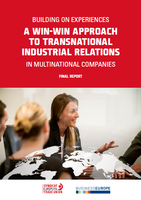 This evaluation on the practical experience of transnational company agreements was published in October 2018 in Brussels. So far there are over 280 such agreements, which are however not legally binding. The European Trade Union Confederation (ETUC) and the European Parliament have already been demanding a legislative initiative on the subject since 2013 (see
This evaluation on the practical experience of transnational company agreements was published in October 2018 in Brussels. So far there are over 280 such agreements, which are however not legally binding. The European Trade Union Confederation (ETUC) and the European Parliament have already been demanding a legislative initiative on the subject since 2013 (see  Reference manual on trade unions in 48 countries
Reference manual on trade unions in 48 countries In January 2019, a compilation was released on the "Smart Factory", i.e. the technological vision of a fully automated and intelligent factory. It contains the results of a project headed by the University of Tübingen (Germany) and sponsored by the EU. By means of surveys and expert interviews, scientists and trade unionists from four countries have examined the pressure put on collective labour relations as a result of digitalization and Industry 4.0. The reports concentrate on economically strong regions in Germany (Baden-Wurttemberg), Italy (Lombardy), Spain (Catalonia) and Sweden (West Gothland). The compilation is in two languages, some contributions only in English and others only in German.
In January 2019, a compilation was released on the "Smart Factory", i.e. the technological vision of a fully automated and intelligent factory. It contains the results of a project headed by the University of Tübingen (Germany) and sponsored by the EU. By means of surveys and expert interviews, scientists and trade unionists from four countries have examined the pressure put on collective labour relations as a result of digitalization and Industry 4.0. The reports concentrate on economically strong regions in Germany (Baden-Wurttemberg), Italy (Lombardy), Spain (Catalonia) and Sweden (West Gothland). The compilation is in two languages, some contributions only in English and others only in German. For the first time in February 2019, the Hans Böckler Foundation presented a study which analyses the behavior of management towards codetermination and works councils in foreign controlled companies in Germany. The research workers have put together a series of literal assessments from sources interviewed in 21 case studies. It shows that most conflicts arose due to local management's lack of freedom in decision-making as well as due to strict objectives imposed by the group's foreign headquarters. International benchmarking and internal competition between sites as well as relocation of activities abroad are likewise important sources of conflict. If the company headquarters lies in a country where shareholder value has a greater emphasis (USA, UK) then there is greater potential for conflict. A further decisive factor is the role played by the German sites in the group's global supply chain.
For the first time in February 2019, the Hans Böckler Foundation presented a study which analyses the behavior of management towards codetermination and works councils in foreign controlled companies in Germany. The research workers have put together a series of literal assessments from sources interviewed in 21 case studies. It shows that most conflicts arose due to local management's lack of freedom in decision-making as well as due to strict objectives imposed by the group's foreign headquarters. International benchmarking and internal competition between sites as well as relocation of activities abroad are likewise important sources of conflict. If the company headquarters lies in a country where shareholder value has a greater emphasis (USA, UK) then there is greater potential for conflict. A further decisive factor is the role played by the German sites in the group's global supply chain.
 An extraordinary steering committee meeting of Dana's EWC was held on 7 March 2019 in Neu-Ulm (Germany). The EWC had been previously informed that parts of the accounting department were to be relocated to Eastern Europe, which would result in the loss of approximately 100 jobs in Western Europe. EWC Academy advisors are currently working on the economic analysis. The Dana EWC agreement is subject to German jurisdiction and was last updated in 2014 (see
An extraordinary steering committee meeting of Dana's EWC was held on 7 March 2019 in Neu-Ulm (Germany). The EWC had been previously informed that parts of the accounting department were to be relocated to Eastern Europe, which would result in the loss of approximately 100 jobs in Western Europe. EWC Academy advisors are currently working on the economic analysis. The Dana EWC agreement is subject to German jurisdiction and was last updated in 2014 (see  On 8 and 9 April 2019, the SE works council from GK Software met for the first training since its establishment in Plauen (East Germany). The startup which was founded in 1990 has expanded through acquisitions to become the largest listed company in the Eastern German federal state of Saxonia with currently 1,200 employees. The technology company has been operating as a European Company (SE) since January 2018. The SE works council is responsible for eight sites in Germany and Czechia, and other sites in France, Spain and the UK are currently under construction. Central management has managed to keep the supervisory board free of employee representatives by means of the SE conversion.
On 8 and 9 April 2019, the SE works council from GK Software met for the first training since its establishment in Plauen (East Germany). The startup which was founded in 1990 has expanded through acquisitions to become the largest listed company in the Eastern German federal state of Saxonia with currently 1,200 employees. The technology company has been operating as a European Company (SE) since January 2018. The SE works council is responsible for eight sites in Germany and Czechia, and other sites in France, Spain and the UK are currently under construction. Central management has managed to keep the supervisory board free of employee representatives by means of the SE conversion. Our annual introductory seminar for the members (or future members) of European and SE works councils as well as Special Negotiating Bodies is being organized from 23 to 26 April 2019 in Montabaur Castle. The castle is situated close to the high-speed railway station half-way between Frankfurt and Cologne. The following seminar modules will be covered at two levels in parallel:
Our annual introductory seminar for the members (or future members) of European and SE works councils as well as Special Negotiating Bodies is being organized from 23 to 26 April 2019 in Montabaur Castle. The castle is situated close to the high-speed railway station half-way between Frankfurt and Cologne. The following seminar modules will be covered at two levels in parallel: The rules for the processing of personal data in the EU were unified in 2018. The General Data Protection Regulation replaces all previous national legislations since May 2018 including the German Federal Law on Data Protection. A seminar will be held on the subject from 1 to 3 July 2018 in Mainz. The evening program will include a visit to the Kupferbergterrasse, the world's deepest sparkling wine cellar.
The rules for the processing of personal data in the EU were unified in 2018. The General Data Protection Regulation replaces all previous national legislations since May 2018 including the German Federal Law on Data Protection. A seminar will be held on the subject from 1 to 3 July 2018 in Mainz. The evening program will include a visit to the Kupferbergterrasse, the world's deepest sparkling wine cellar. Legal EWC workshop
Legal EWC workshop